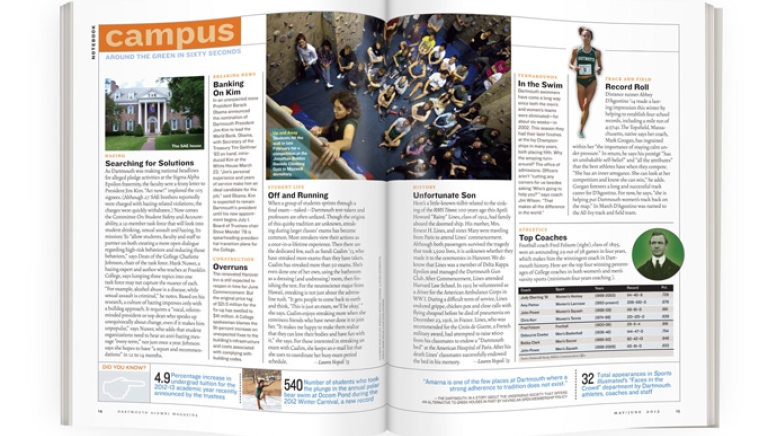Searching for Solutions
As Dartmouth was making national headlines for alleged pledge activities at the Sigma Alpha Epsilon fraternity, the faculty sent a feisty letter to President Jim Kim. “Act now!” implored the 105 signees. (Although 27 SAE brothers were charged with hazing-related violations, the charges were quickly withdrawn.) Now comes the Committee On Student Safety and Accountability, a 12-member task force that will look into student drinking, sexual assault and hazing. Its mission: To “allow students, faculty and staff to partner on both creating a more open dialogue regarding high-risk behaviors and reducing those behaviors,” says Dean of the College Charlotte Johnson, chair of the task force. Hank Nuwer, a hazing expert and author who teaches at Franklin College, says lumping three topics into one task force may not capture the nuance of each. “For example, alcohol abuse is a disease, while sexual assault is criminal,” he notes. Based on his research, a culture of hazing improves only with a bulldog approach. It requires a “vocal, reform-minded president or top dean who speaks up unequivocally about change, even if it makes him unpopular,” says Nuwer, who adds that student organizations need to hear an anti-hazing message “every term,” not just once a year. Johnson says she hopes to have “a report and recommendations” in 12 to 14 months.
Banking On Kim
In an unexpected move President Barack Obama announced the nomination of Dartmouth President Jim Kim to lead the World Bank. Obama, with Secretary of the Treasury Tim Geithner ’83 on hand, introduced Kim at the White House March 23. “Jim’s personal experience and years of service make him an ideal candidate for the job,” said Obama. Kim is expected to remain Dartmouth’s president until his new appointment begins July 1. Board of Trustees chair Steve Mandel ’78 is spearheading presidential transition plans for the College.
Overruns
The renovated Hanover Inn is still expected to reopen in time for June Commencement. But the original price tag of $21.5 million for the fix-up has swelled to $41 million. A College spokesman blames the 91-percent increase on unexpected fixes to the building’s infrastructure and costs associated with complying with building codes.
Off and Running
When a group of students sprints through a final exam—naked—Dartmouth test-takers and professors are often unfazed. Though the origins of this quirky tradition are unknown, streaking during larger classes’ exams has become common. Most streakers view their actions as a once-in-a-lifetime experience. Then there are the dedicated few, such as Sandi Caalim ’13, who have streaked more exams than they have taken. Caalim has streaked more than 50 exams. She’s even done one of her own, using the bathroom as a dressing (and undressing) room, then finishing the test. For the neuroscience major from Hawaii, streaking is not just about the adrenaline rush. “It gets people to come back to earth and think, ‘This is just an exam, we’ll be okay,’ ” she says. Caalim enjoys streaking more when she convinces friends who have never done it to join her. “It makes me happy to make them realize that they can love their bodies and have fun with it,” she says. For those interested in streaking an exam with Caalim, she keeps an e-mail list that she uses to coordinate her busy exam period schedule. —Lauren Vespoli ’13
Unfortunate Son
Here’s a little-known tidbit related to the sinking of the RMS Titanic 100 years ago this April: Howard “Rainy” Lines, class of 1912, had family aboard the doomed ship. His mother, Mrs. Ernest H. Lines, and sister Mary were traveling from Paris to attend Lines’ commencement. Although both passengers survived the tragedy that took 1,500 lives, it is unknown whether they made it to the ceremonies in Hanover. We do know that Lines was a member of Delta Kappa Epsilon and managed the Dartmouth Gun Club. After Commencement, Lines attended Harvard Law School. In 1915 he volunteered as a driver for the American Ambulance Corps in WW I. During a difficult term of service, Lines endured grippe, chicken pox and close calls with flying shrapnel before he died of pneumonia on December 23, 1916, in France. Lines, who was recommended for the Croix de Guerre, a French military award, had attempted to raise $600 from his classmates to endow a “Dartmouth bed” at the American Hospital of Paris. After his death Lines’ classmates successfully endowed the bed in his memory. —Lauren Vespoli ’13
In the Swim
Dartmouth swimmers have come a long way since both the men’s and women’s teams were eliminated—for about six weeks—in 2002. This season they had their best finishes at the Ivy Championships in many years, both placing fifth. Why the amazing turnaround? The office of admissions. Officers aren’t “cutting any corners for us besides asking ‘Who’s going to help you?’ ” says coach Jim Wilson. “That makes all the difference in the world.”
Record Roll
Distance runner Abbey D’Agostino ’14 made a lasting impression this winter by helping to establish four school records, including a mile run of 4:37:41. The Topsfield, Massachusetts, native says her coach, Mark Coogan, has ingrained within her “the importance of staying calm under pressure.” In return, he says his protégé “has an unshakable self-belief” and “all the attributes” that the best athletes have when they compete. “She has an inner arrogance. She can look at her competition and know she can win,” he adds. Coogan foresees a long and successful track career for D’Agostino. For now, he says, “she is helping put Dartmouth women’s track back on the map.” In March D’Agostino was named to the All-Ivy track and field team.
Top Coaches
Football coach Fred Folsom, class of 1895, won an astounding 29 out of 38 games in four years, which makes him the winningest coach in Dartmouth history. Here are the top four winning percentages of College coaches in both women’s and men’s varsity sports (minimum four years coaching).





